Search results for 'Faith' (72)

On a recent walk with Maria, we picked up an acorn lying near the road. It looked different from the ones we were most familiar with but looking skyward there was no doubting where it had come from. The majestic one-hundred-foot oak tree towered over us. Having grown up with two oak trees in my back yard, each more than a hundred years old, I have always loved acorns. Within the acorn is a tiny embryo that bears the potential to become a mighty oak tree. In fact, that is the only thing an acorn can become. That is God's design. Then God said: Let the earth bring forth vegetation: every kind of plant that bears seed and every kind of fruit tree on earth that bears fruit with its seed in it. And so it happened: the earth brought forth vegetation: every kind of plant that bears seed and every kind of fruit tree that bears fruit with its seed in it. God saw that it was good. Genesis 1:11-12 Take some time to reflect on the acorn and the oak. My question to you is do you know who you were created to be? There is no doubt in God's mind who you are. Can you embrace the idea that God has placed in you all you are meant to be? You are full of potential. That is God's design. "Faith sees a beautiful blossom in a bulb, a lovely garden in a seed, and a giant oak in an acorn.” -- William Arthur Ward

It was a difficult feeling to describe. I'd been unsettled for days and couldn't figure out why. Finally, the word hit me. I was feeling adrift. It wasn't as though I was lost. No, I was very engaged in my latest DIY project. For years rainstorms had been depositing increasingly bigger pools of water directly in front of our porch and eventually into our basement. We had installed a French drain when we first moved into this house over 20 years ago but it was obviously not working very well. Take a look...
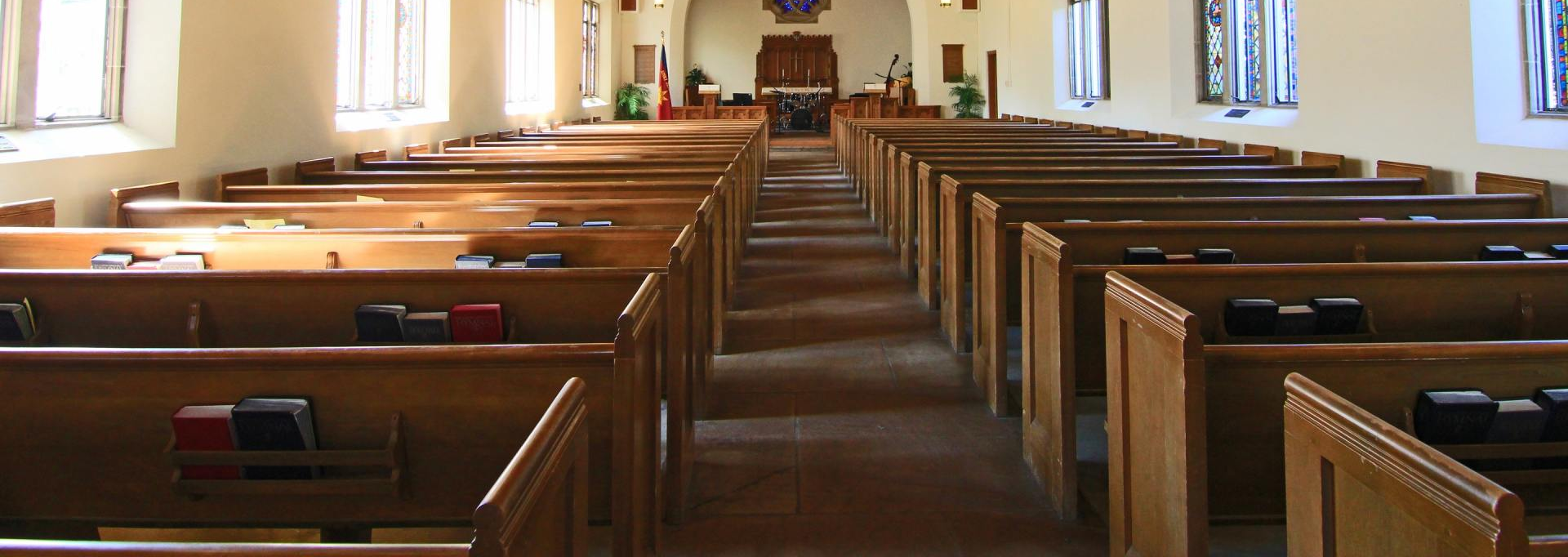
Like the tomb, our church buildings are empty. But the Good News is that, like Jesus, the Body of Christ is alive!! He is not here; he has risen! Luke 24:6 Today, from our homes, as we worship God on Easter Sunday be reminded of Jesus' words, "...the gates of hell shall not prevail against it." Embrace the hope and joy that regardless of what is happening around us we, as the Body of Christ, shall prevail. Never forget the Good News that Jesus was, is and always will be––in the Resurrection business. Have a blessed Easter!

With lots of time on my hands I decided to tackle a task I'd been putting off for months. A little background will provide context for an unexpected blessing. I began blogging almost ten years ago. Initially, I used a small email list at the church I was working at to share my reflections of the weekly Gospel. The list slowly grew as I gathered email addresses from attendees at our adult education sessions. When an illness forced me to quit my church job six years ago I continued blogging on my website. As I neared the completion of my book, Our Journey WITH God , I decided to pause my blogging to focus on finishing the book. Once the book went into production I turned my attention to this, my newly rebranded website - www.joekillian.com . The rebranding left me with over 150 blog entries on my old website. I was paying monthly for the old website for the sole purpose of archiving the tens of thousands of words until I transferred them to the new website. In the midst of that tedious, and at times frustrating slow process I experienced an incredible blessing. After reading dozens of my reflections, rooted in scripture, I came to realize that almost all of them brought me peace and comfort in this challenging time. The reason is simple, God is at the center of it all. Even if you don't read a single blog entry on my website I encourage you to take the time to watch this video of Ryan Stephenson's Eye of the Storm. God is present in all things, especially in the eye of the storm––where He remains in control!
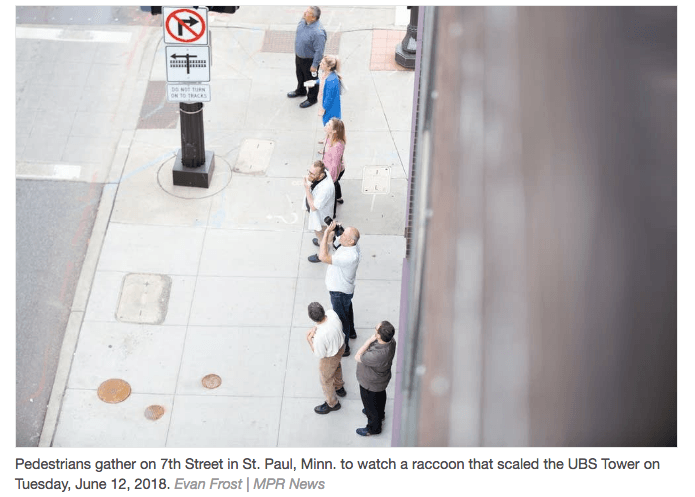
Everyone loves a good story, right? Did you hear the one about the raccoon climbing up the outside of a skyscraper in St. Paul Minnesota? It was first reported by Minnesota Public Radio News and quickly became an internet sensation. The raccoon's story began trending on social media with the hashtag #mprraccoon. Some people were reported as following the story until 2:30 in the morning when the raccoon was finally captured. Why were so many people captivated by this story and how does it apply to this week's Gospel? Jesus said to the crowds: “This is how it is with the kingdom of God; it is as if a man were to scatter seed on the land and would sleep and rise night and day and through it all the seed would sprout and grow, he knows not how. Of its own accord the land yields fruit, first the blade, then the ear, then the full grain in the ear. And when the grain is ripe, he wields the sickle at once, for the harvest has come.” He said, “To what shall we compare the kingdom of God, or what parable can we use for it? It is like a mustard seed that, when it is sown in the ground, is the smallest of all the seeds on the earth. But once it is sown, it springs up and becomes the largest of plants and puts forth large branches, so that the birds of the sky can dwell in its shade.” With many such parables he spoke the word to them as they were able to understand it. Without parables he did not speak to them, but to his own disciples he explained everything in private. Mark 4:26-34 In 46 different instances, Jesus uses parables to deliver His message. In these particular ones, Jesus speaks to the growth cycle of the Kingdom of God. As is typical, there is dual meaning in Jesus' stories. The literal meaning of the message is meant for the "general" consumption of the crowds. The symbolic or deeper meaning was saved for the disciples. What were the crowds seeking as they listened to Jesus? We never really know. What we do know is that it is a part of human nature to be captivated by a "good" story. Here is a photo of people who stopped to watch the raccoon in Minnesota.

We just attended our nephew's commencement ceremony as he graduated from high school. Of course, the message of being prepared for the future was a common theme amongst the various speakers. Seeing the potential of each graduate as they walked across the stage was inspiring but I found myself wondering what the future held for these 18 year-olds? Preparation is also part of the message in this week's Gospel. On the first day of the Feast of Unleavened Bread, when they sacrificed the Passover lamb, Jesus’ disciples said to him, "Where do you want us to go and prepare for you to eat the Passover?" He sent two of his disciples and said to them, "Go into the city and a man will meet you, carrying a jar of water. Follow him. Wherever he enters, say to the master of the house, 'The Teacher says, "Where is my guest room where I may eat the Passover with my disciples?"' Then he will show you a large upper room furnished and ready. Make the preparations for us there." The disciples then went off, entered the city, and found it just as he had told them; and they prepared the Passover. While they were eating, he took bread, said the blessing, broke it, gave it to them, and said, "Take it; this is my body." Then he took a cup, gave thanks, and gave it to them, and they all drank from it. He said to them, "This is my blood of the covenant, which will be shed for many. Amen, I say to you, I shall not drink again the fruit of the vine until the day when I drink it new in the kingdom of God." Then, after singing a hymn, they went out to the Mount of Olives. Mark 14:12-16, 22-26 Preparing for the Passover meal was a regular occurrence for these Jewish men. What they could not have been ready for were Jesus' words during the meal. "This is my body." And if that wasn't unexpected enough, "This is my blood of the covenant, which will be shed for many." More importantly, there could be no preparing for the actuality of what the disciples would experience as Jesus' words came to pass. Jesus was describing a unique experience and no matter what He told the disciples they simply could not be prepared for their coming future. They were about to "commence" a new journey. In time, the disciples thought back on Jesus' words at the Passover supper they eventually came to realize that He had not only prepared them for their future but was providing for them as well. Commencement speakers try to give the perfect advice to the graduating class. Young, idealistic graduates are told they have been prepared for the journey ahead. In reality, there is no way they can know what awaits them. It is important for them to remember that the foundation has been laid in their school and family experience. But life can be full of surprises, many unpleasant. That is why we need to trust in Jesus' "commencement" words. Only He prepares us and provides us what we need for our journey with God, His body and blood!

Do you have doubts? Me too. We all do about one thing or another. Why is that? Did you know that the very first thing Satan said in the Book of Genesis was intended to create doubt? He said to Eve, "Did God really say?" Doubt has been a part of our common human condition since the beginning of time. We read about doubt throughout the Bible. In the New Testament, we frequently read about the disciples' doubt. In this week's Gospel, it appears at a significant moment in time. The eleven disciples went to Galilee, to the mountain to which Jesus had ordered them. When they all saw him, they worshiped, but they doubted. Then Jesus approached and said to them, "All power in heaven and on earth has been given to me. Go, therefore, and make disciples of all nations, baptizing them in the name of the Father, and of the Son, and of the Holy Spirit, teaching them to observe all that I have commanded you. And behold, I am with you always, until the end of the age." Matthew 28:16-20 In this case, the disciples' doubt occurs concurrently with their worship. How is that possible? When the resurrected Jesus appears their first response is to worship Him. And then they doubt. Jesus' response to their worship and doubt? As God, He commissions them to "go" and do for God. Then Jesus concludes with a statement that leaves no doubt. "And behold, I am with you always, until the end of the age." Doubt originated in the Garden of Eden. Doubt is the human part of our relationship with God. But as we see here in Jesus' concluding statement, there is no doubt in God. He is always and forever with us. If we are honest with ourselves, it is natural to doubt that things are going to work out the way we want. What do we do with our doubts? We must rely on the words of Jesus, "I am with you always, until the end of the age." That leaves no doubt!

It strikes me as odd that I need to be reminded that I have a Reminders app on my phone. I use it sparingly but when I do it can be extremely helpful in my busy and often distracted life. Siri hears me and repeats my message to ensure that she got it right and then she promises to remind me. Then at the appointed time, up pops my reminder. In this week's Gospel we hear about the most important "reminder" of all time. On the evening of that first day of the week, when the doors were locked, where the disciples were, for fear of the Jews, Jesus came and stood in their midst and said to them, "Peace be with you." When he had said this, he showed them his hands and his side. The disciples rejoiced when they saw the Lord. Jesus said to them again, "Peace be with you. As the Father has sent me, so I send you." And when he had said this, he breathed on them and said to them, "Receive the Holy Spirit. Whose sins you forgive are forgiven them, and whose sins you retain are retained." Thomas, called Didymus, one of the Twelve, was not with them when Jesus came. So the other disciples said to him, "We have seen the Lord." But he said to them, "Unless I see the mark of the nails in his hands and put my finger into the nailmarks and put my hand into his side, I will not believe." Now a week later his disciples were again inside and Thomas was with them. Jesus came, although the doors were locked, and stood in their midst and said, "Peace be with you." Then he said to Thomas, "Put your finger here and see my hands, and bring your hand and put it into my side, and do not be unbelieving, but believe." Thomas answered and said to him, "My Lord and my God!" Jesus said to him, "Have you come to believe because you have seen me? Blessed are those who have not seen and have believed." Now Jesus did many other signs in the presence of his disciples that are not written in this book. But these are written that you may come to believe that Jesus is the Christ, the Son of God, and that through this belief you may have life in his name. John 20:19-31 Many thoughts surely swirled through the minds of the disciples as they hid in fear. "This isn't what we expected to happen." "What now?" Then Jesus appeared. When He does greet the disciples, Jesus actually repeated Himself. "Peace be with you." Jesus states before and after showing the disciples His wounds. In the midst of their joy in Jesus' resurrection, the disciples are reminded of His death. The nail marks and the wound in Jesus' side remain on His resurrected body. They remind the disciples of the reason Jesus came in the first place. Because we look back on Jesus' life, death and resurrection we have the advantage of seeing the big picture. We see God's story of creation, the fall in the garden along with the struggles of the Israelites to remain true to God prior to Jesus' coming. Most importantly, we see salvation through His cross. In all of this, we see God's purposes. Therein lies the Greatest Reminder... "...that you may come to believe that Jesus is the Christ, the Son of God, and that through this belief you may have life in his name."
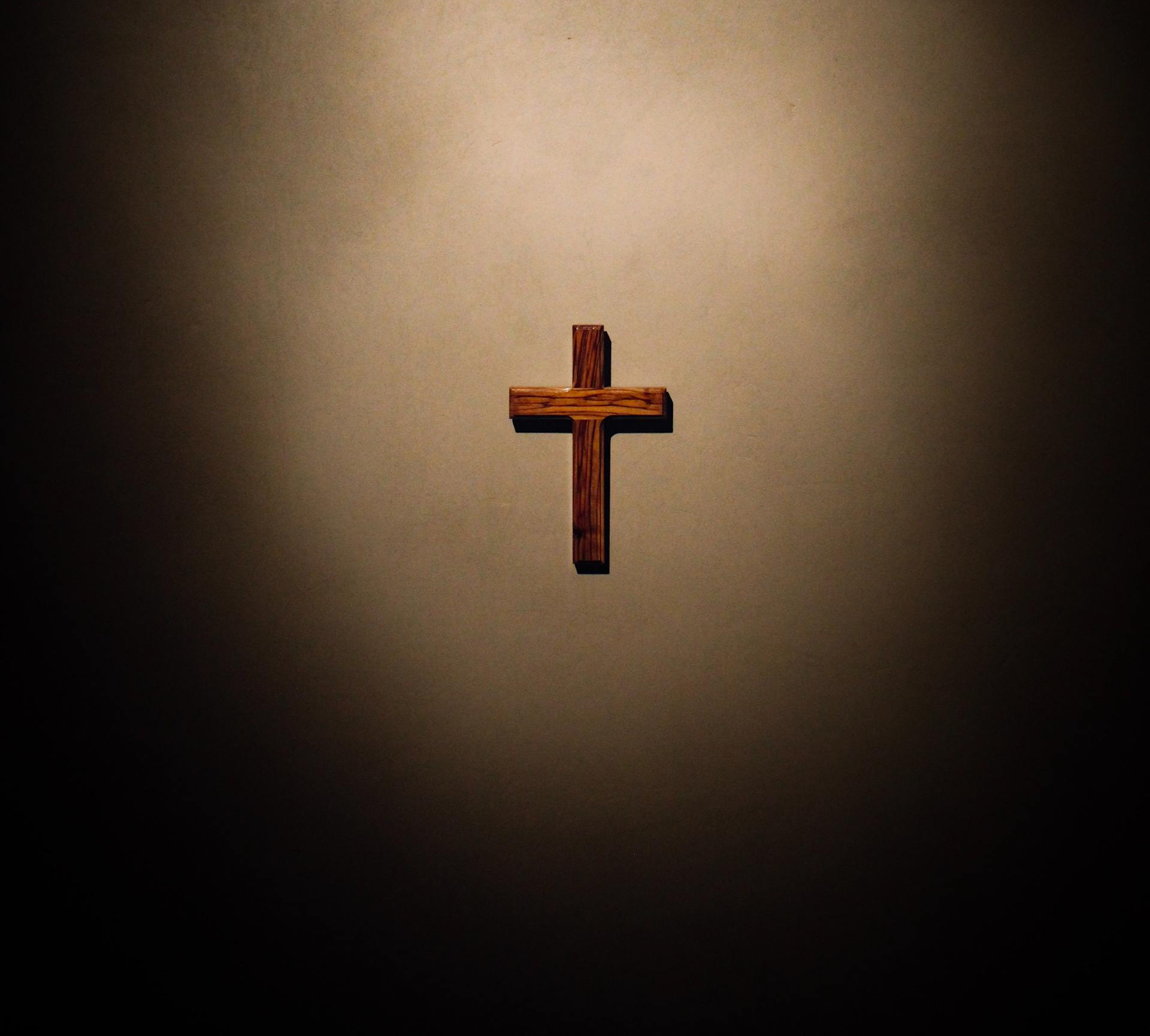
On the first day of the week, Mary of Magdala came to the tomb early in the morning, while it was still dark, and saw the stone removed from the tomb. So she ran and went to Simon Peter and to the other disciple whom Jesus loved, and told them, “They have taken the Lord from the tomb, and we don't know where they put him.” So Peter and the other disciple went out and came to the tomb. They both ran, but the other disciple ran faster than Peter and arrived at the tomb first; he bent down and saw the burial cloths there, but did not go in. When Simon Peter arrived after him, he went into the tomb and saw the burial cloths there, and the cloth that had covered his head, not with the burial cloths but rolled up in a separate place. Then the other disciple also went in, the one who had arrived at the tomb first, and he saw and believed. For they did not yet understand the Scripture that he had to rise from the dead. John 20:1-9 Have a blessed Easter!
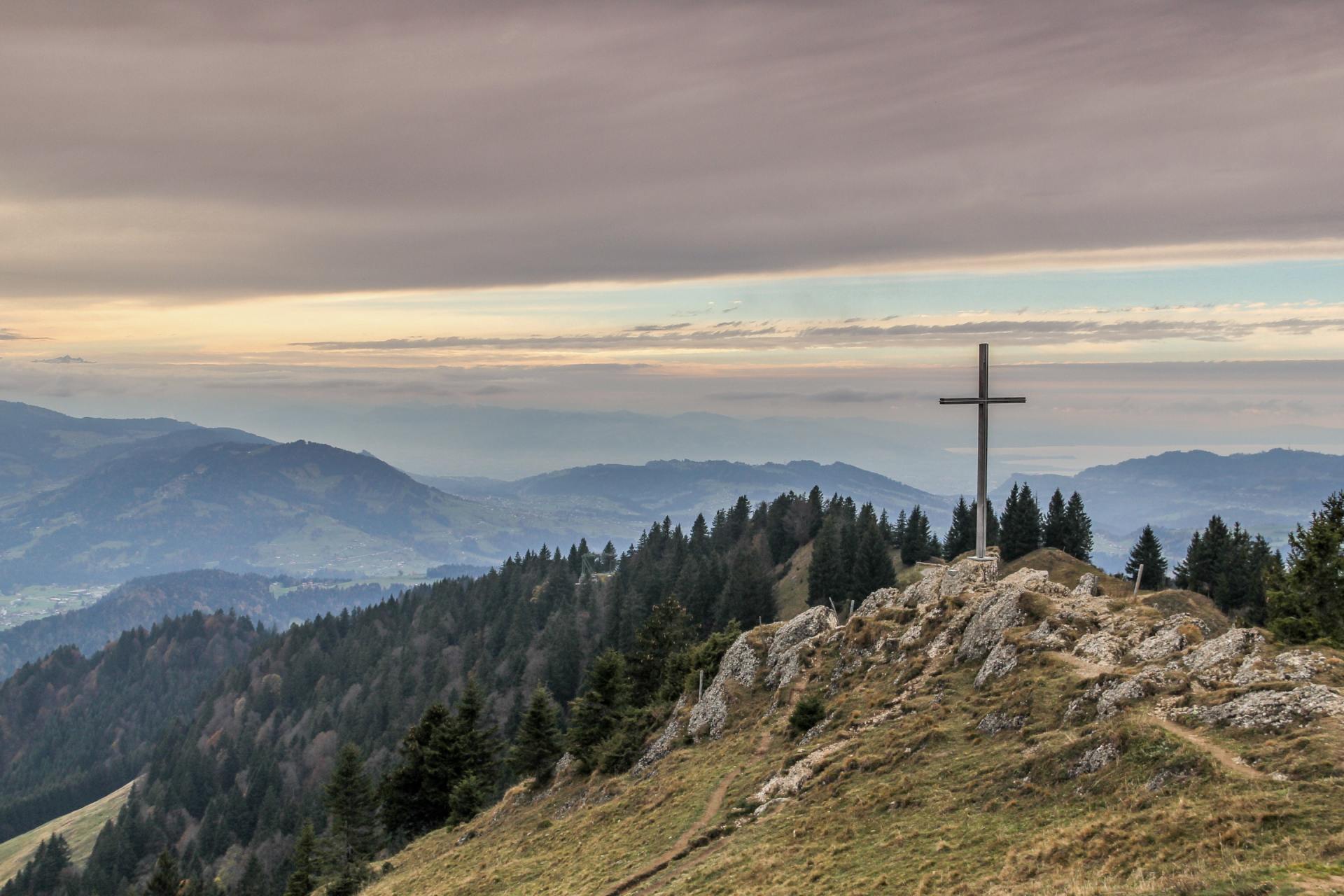
Have you ever had an experience that caused you to stop and say, "What just happened?" We just had a family emergency that caused me to look back and ask that question. I'm still trying to make sense of everything that happened. With Palm Sunday upon us, I'm wondering about how those around Jesus might have answered that question in the days surrounding His crucifixion. As soon as morning came, the chief priests with the elders and the scribes, that is, the whole Sanhedrin held a council. They bound Jesus, led him away, and handed him over to Pilate. Pilate questioned him, "Are you the king of the Jews?" He said to him in reply, "You say so." The chief priests accused him of many things. Again Pilate questioned him, "Have you no answer? See how many things they accuse you of." Jesus gave him no further answer, so that Pilate was amazed. Now on the occasion of the feast he used to release to them one prisoner whom they requested. A man called Barabbas was then in prison along with the rebels who had committed murder in a rebellion. The crowd came forward and began to ask him to do for them as he was accustomed. Pilate answered, "Do you want me to release to you the king of the Jews?" For he knew that it was out of envy that the chief priests had handed him over. But the chief priests stirred up the crowd to have him release Barabbas for them instead. Pilate again said to them in reply, "Then what do you want me to do with the man you call the king of the Jews?" They shouted again, "Crucify him." Pilate said to them, "Why? What evil has he done?" They only shouted the louder, "Crucify him." So Pilate, wishing to satisfy the crowd, released Barabbas to them and, after he had Jesus scourged, handed him over to be crucified. The soldiers led him away inside the palace, that is, the praetorium, and assembled the whole cohort. They clothed him in purple and, weaving a crown of thorns, placed it on him. They began to salute him with, "Hail, King of the Jews!" and kept striking his head with a reed and spitting upon him. They knelt before him in homage. And when they had mocked him, they stripped him of the purple cloak, dressed him in his own clothes, and led him out to crucify him. They pressed into service a passer-by, Simon, a Cyrenian, who was coming in from the country, the father of Alexander and Rufus, to carry his cross. They brought him to the place of Golgotha — which is translated Place of the Skull — They gave him wine drugged with myrrh, but he did not take it. Then they crucified him and divided his garments by casting lots for them to see what each should take. It was nine o'clock in the morning when they crucified him. The inscription of the charge against him read, "The King of the Jews." With him they crucified two revolutionaries, one on his right and one on his left. Those passing by reviled him, shaking their heads and saying, "Aha! You who would destroy the temple and rebuild it in three days, save yourself by coming down from the cross." Likewise the chief priests, with the scribes, mocked him among themselves and said, "He saved others; he cannot save himself. Let the Christ, the King of Israel, come down now from the cross that we may see and believe." Those who were crucified with him also kept abusing him. At noon darkness came over the whole land until three in the afternoon. And at three o'clock Jesus cried out in a loud voice, "Eloi, Eloi, lema sabachthani?" which is translated, "My God, my God, why have you forsaken me?" Some of the bystanders who heard it said, "Look, he is calling Elijah." One of them ran, soaked a sponge with wine, put it on a reed and gave it to him to drink saying, "Wait, let us see if Elijah comes to take him down." Jesus gave a loud cry and breathed his last. The veil of the sanctuary was torn in two from top to bottom. When the centurion who stood facing him saw how he breathed his last he said, "Truly this man was the Son of God!" Mark 15:1-39 As Jesus entered Jerusalem, those closest to Him must have constantly wondered about everything that was swirling around Jesus. The Sanhedrin, Pilate and the crowds all played a part in an emotionally charged "trial", where the defendant passively accepted His brutal and gruesome fate. The question, "What just happened?" would have elicited many answers depending on the individual. We do hear an answer from one person, the centurion at the foot of the cross. This man showed up for an ordinary workday. (Yes it was ordinary for a Roman centurion to be a part of a crucifixion.) He witnesses the death of another "criminal" he may never have laid eyes on before. However, something causes him to come to an extraordinary conclusion. The experience of listening to Jesus' passion and crucifixion each year provides us with an opportunity. We can ask ourselves, "What just happened?" Depending on where we are in life at that instant we will have a unique response. The Lenten journey allows us to reflect on what happened to Jesus. We must, at the same time, remember Who He was. The centurion helps us in that. "Truly this man was the Son of God." Have a blessed Holy Week!

It’s snowing again this morning. March in southwestern Pennsylvania; it was three times warmer in February! I wonder if the poor flowers that sprouted early will survive? Those bulbs beneath the frozen ground eventually bring us the first glimpse of spring. It is almost here. I can’t wait!!! The Gospel does the same this week. Some Greeks who had come to worship at the Passover Feast came to Philip, who was from Bethsaida in Galilee, and asked him, "Sir, we would like to see Jesus." Philip went and told Andrew; then Andrew and Philip went and told Jesus. Jesus answered them, "The hour has come for the Son of Man to be glorified. Amen, amen, I say to you, unless a grain of wheat falls to the ground and dies, it remains just a grain of wheat; but if it dies, it produces much fruit. Whoever loves his life loses it, and whoever hates his life in this world will preserve it for eternal life. Whoever serves me must follow me, and where I am, there also will my servant be. The Father will honor whoever serves me. "I am troubled now. Yet what should I say? 'Father, save me from this hour'? But it was for this purpose that I came to this hour. Father, glorify your name." Then a voice came from heaven, "I have glorified it and will glorify it again." The crowd there heard it and said it was thunder; but others said, "An angel has spoken to him." Jesus answered and said, "This voice did not come for my sake but for yours. Now is the time of judgment on this world; now the ruler of this world will be driven out. And when I am lifted up from the earth, I will draw everyone to myself." He said this indicating the kind of death he would die. John 12:20-33 in the midst of the Passover Feast Jesus’ presence has created a buzz. The Greeks from afar want to see Him. The disciples have their expectations of Jesus’ role but His words continue to puzzle them. Jesus, on the other hand, clearly understands His purpose. Jesus provides an unsolicited explanation of the meaning of life and death. Death must come in order for new life to spring forth. Our winters are the same. All flowers wilt and eventually die in the fall. Green turns to brown and the snow buries everything in winter white. And yet hope lies beneath the surface. The disciples surely struggled to understand the meaning of Jesus' prediction. Death? Jesus demonstrated what it meant to live through death. We are called to do the same. We must be willing to die to self so that we can live in Him. This is the harsh reality of the Christian life. But the beautiful fruit that results is worth enduring, just like our winter!

I recently read a book about God and the human brain. In the book, researchers asked people what they thought God looked like. The question produced a lengthy pause in most adults. This was significant to the neuroscientist because it meant that a great deal of neurological activity was taking place as different parts of the brain attempted to put into words a concept that defies the parameters of language for many people. In this week's Gospel, we hear about someone who surely wrestled with a description of what God looked like. Jesus said to Nicodemus: “Just as Moses lifted up the serpent in the desert, so must the Son of Man be lifted up, so that everyone who believes in him may have eternal life.” For God so loved the world that he gave his only Son, so that everyone who believes in him might not perish but might have eternal life. For God did not send his Son into the world to condemn the world, but that the world might be saved through him. Whoever believes in him will not be condemned, but whoever does not believe has already been condemned, because he has not believed in the name of the only Son of God. And this is the verdict, that the light came into the world, but people preferred darkness to light, because their works were evil. For everyone who does wicked things hates the light and does not come toward the light, so that his works might not be exposed. But whoever lives the truth comes to the light, so that his works may be clearly seen as done in God. John 3:14-21 Nicodemus receives multiple images for God in his conversation with Jesus. The first is of the Son of Man, then he hears of God as a loving Father. Next, Jesus describes God as light coming into the world. What a profound experience this must have been for Nicodemus. What must his brain have been experiencing as Jesus' descriptions challenged his previous images of God? When you read this Gospel what does God look like to you? I imagine two images. One is of Jesus suffering unbearably on the cross. That image comes in a variety of forms as I recollect everything from various crucifixes and paintings I've seen to the brutally graphic depiction of the crucifixion in the movie The Passion of the Christ by Mel Gibson. The second image I imagine is more vague. In fact, I struggle to even explore it because I can't fathom its depth. As a father, my brain can't even begin to grasp what God the Father saw as life ebbed away from the body of His beloved Son. What does God look like? I can't think of a better answer than, "God so loved the world..."

Flu shots begin months before the season hits in hopes of keeping things under control. In spite of this, we find ourselves in the midst of one of the worst flu seasons on record. We take all kinds of additional precautions to stay healthy. I found this to be an interesting parallel to this week's Gospel. A leper came to Jesus and kneeling down begged him and said, "If you wish, you can make me clean." Moved with pity, he stretched out his hand, touched him, and said to him, "I do will it. Be made clean." The leprosy left him immediately, and he was made clean. Then, warning him sternly, he dismissed him at once. He said to him, "See that you tell no one anything, but go, show yourself to the priest and offer for your cleansing what Moses prescribed; that will be proof for them." The man went away and began to publicize the whole matter. He spread the report abroad so that it was impossible for Jesus to enter a town openly. He remained outside in deserted places, and people kept coming to him from everywhere. Mark 1:40-45 Lepers were complete outcasts in Jesus' time. In the Book of Leviticus we hear, "He shall dwell apart, making his abode outside the camp." Much of Leviticus is oriented towards living in ways that allowed for people to stay healthy. In biblical times separation was the only truly effective way to control an infectious disease. People would go out of their way to avoid the lepers who were required to announce themselves as unclean. That is why Jesus touching the leper was so astonishing. It appeared that Jesus was throwing caution to the wind. The leper sought out Jesus. The leper's enthusiasm for his healing created a frenzy that forced Jesus to remain separated from the towns in which He wanted to minister. Think about the irony of that. People needed to come to Jesus instead of Him coming to them. The same is true today. People need the spiritual healing that Jesus brings but if we don't present Him as the "cure" how are they going to find Him? In knowing Jesus, we have what the world needs! The question is, are we enthusiastically pronouncing it to others?
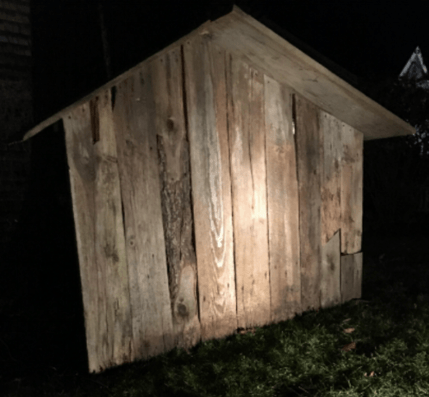
Years ago I built a manger out of Maria's grandfather's barn wood. This year we decided to leave it empty in anticipation of the arrival of the Christ child on Christmas. In all honesty it has been hard to wait, especially as we see the nativities in our neighborhood filled with figurines looking in awe upon the baby Jesus. Imagine the anticipation of the virgin Mary once she received her angelic visitor. The angel Gabriel was sent from God to a town of Galilee called Nazareth, to a virgin betrothed to a man named Joseph, of the house of David, and the virgin's name was Mary. And coming to her, he said, "Hail, full of grace! The Lord is with you." But she was greatly troubled at what was said and pondered what sort of greeting this might be. Then the angel said to her, "Do not be afraid, Mary, for you have found favor with God. "Behold, you will conceive in your womb and bear a son, and you shall name him Jesus. He will be great and will be called Son of the Most High, and the Lord God will give him the throne of David his father, and he will rule over the house of Jacob forever, and of his kingdom there will be no end." But Mary said to the angel, "How can this be, since I have no relations with a man?" And the angel said to her in reply, "The Holy Spirit will come upon you, and the power of the Most High will overshadow you. Therefore the child to be born will be called holy, the Son of God. And behold, Elizabeth, your relative, has also conceived a son in her old age, and this is the sixth month for her who was called barren; for nothing will be impossible for God." Mary said, "Behold, I am the handmaid of the Lord. May it be done to me according to your word." Then the angel departed from her. Luke 1:26-38 Mary could not have anticipated the surprise visit she received from the angel Gabriel. Her initial reaction was one of fear and Gabriel comforts her with words of affirmation and peace. But things were just starting to get interesting. After hearing that she will bear a son Mary learns that her child will be, "...great and will be called Son of the Most High , and the Lord God will give him the throne of David his father, and he will rule over the house of Jacob forever , and of his kingdom there will be no end ." Hold on! Those are some heavy duty expectations!! For nine months Mary carried her baby knowing all of this. For 30 years she waited and wondered. For three days she mourned. And then...the Son of the Most High rose from the dead and eventually rose to His throne to rule forever!!! To say that Mary's wait was worth it is an obvious understatement but how did she endure the waiting? We find out how in Mary's trusting response to the angel Gabriel, "May it be done to me according to your word." Mary accepted her role as Jesus' mother unconditionally. She did so not knowing what it all meant. She simply trusted God, waiting for His Word to come to pass. And I can't wait to put my manger figurines out in my front yard?!? Mary models a graceful acceptance of God's will. We too need to wait on His coming at Christmas and everything that comes everyday beyond.

God's provision never ceases to amaze me. I am grateful to Him for so many things. I simply share this week's Gospel on Thanksgiving weekend with a grateful heart. Jesus said to his disciples: "When the Son of Man comes in his glory, and all the angels with him, he will sit upon his glorious throne, and all the nations will be assembled before him. And he will separate them one from another, as a shepherd separates the sheep from the goats. He will place the sheep on his right and the goats on his left. Then the king will say to those on his right, 'Come, you who are blessed by my Father. Inherit the kingdom prepared for you from the foundation of the world. For I was hungry and you gave me food, I was thirsty and you gave me drink, a stranger and you welcomed me, naked and you clothed me, ill and you cared for me, in prison and you visited me.' Then the righteous will answer him and say, 'Lord, when did we see you hungry and feed you, or thirsty and give you drink? When did we see you a stranger and welcome you, or naked and clothe you? When did we see you ill or in prison, and visit you?' And the king will say to them in reply, 'Amen, I say to you, whatever you did for one of the least brothers of mine, you did for me.' Then he will say to those on his left, 'Depart from me, you accursed, into the eternal fire prepared for the devil and his angels. For I was hungry and you gave me no food, I was thirsty and you gave me no drink, a stranger and you gave me no welcome, naked and you gave me no clothing, ill and in prison, and you did not care for me.' Then they will answer and say, 'Lord, when did we see you hungry or thirsty or a stranger or naked or ill or in prison, and not minister to your needs?' He will answer them, 'Amen, I say to you, what you did not do for one of these least ones, you did not do for me.' And these will go off to eternal punishment, but the righteous to eternal life." Matthew 25:31-46

Perhaps you've seen the cheesy commercial where actor and Verizon spokesman, Thomas Middleditch, drops several microphones as he introduces Verizon's new Unlimited Data Plan. The joke, directed at Verizon's competitors ends up being on Middleditch as his mic drops fail to produce the intended "impact" as they silently land on the carpet. This weeks Gospel could very well have been an actual mic drop moment: Jesus said to the chief priests and the elders of the people: "Hear another parable. There was a landowner who planted a vineyard, put a hedge around it, dug a wine press in it, and built a tower. Then he leased it to tenants and went on a journey. When vintage time drew near, he sent his servants to the tenants to obtain his produce. But the tenants seized the servants and one they beat, another they killed, and a third they stoned. Again he sent other servants, more numerous than the first ones, but they treated them in the same way. Finally, he sent his son to them, thinking, 'They will respect my son.' But when the tenants saw the son, they said to one another, 'This is the heir. Come, let us kill him and acquire his inheritance.' They seized him, threw him out of the vineyard, and killed him. What will the owner of the vineyard do to those tenants when he comes?" They answered him, "He will put those wretched men to a wretched death and lease his vineyard to other tenants who will give him the produce at the proper times." Jesus said to them, "Did you never read in the Scriptures: The stone that the builders rejected has become the cornerstone; by the Lord has this been done, and it is wonderful in our eyes? Therefore, I say to you, the kingdom of God will be taken away from you and given to a people that will produce its fruit." Matthew 21:33-43 In this dialogue Jesus takes the lead in the questioning of the chief priests and elders instead of the other way around. Jesus' parable and subsequent question is ripe with messages that the chief priests and elders miss. They obviously do not recognize Jesus as the son of the vineyard owner. Nor do they realize that their answer to the parable question ends up condemning their own behavior. Jesus follows that up with another question that references the cornerstone from their beloved Scriptures (Psalm 118:22-23). And in so doing Jesus clarifies His message and thus condemns the "wretched men." Much like a comedian who drops the mic on a heckler, Jesus has the last word. The question this raises for you and me is are we producing fruit for the kingdom of God?

Two weeks after hernia repair surgery I got the approval from my surgeon that it was okay to enjoy our pool again. To impress our four-year old Godson I decided to do a cannonball to make a "big wave." I'd like your opinion on something important. When is it too late to change your mind? Well, in my case, once my feet left the pool deck there was no turning back. In this week's Gospel Jesus talks about people changing their minds. Jesus said to the chief priests and elders of the people: "What is your opinion? A man had two sons. He came to the first and said, 'Son, go out and work in the vineyard today.' He said in reply, 'I will not,' but afterwards changed his mind and went. The man came to the other son and gave the same order. He said in reply, 'Yes, sir, 'but did not go. Which of the two did his father's will?" They answered, "The first." Jesus said to them, "Amen, I say to you, tax collectors and prostitutes are entering the kingdom of God before you. When John came to you in the way of righteousness, you did not believe him; but tax collectors and prostitutes did. Yet even when you saw that, you did not later change your minds and believe him." Matthew 21:28-32 The chief priests and elders quickly jumped in with the correct answer. The son who changed his mind after initially rejecting his father had done the right thing. He did what his father had asked him to do. Jesus then rebuked the chief priests and elders by reminding them of their unbelief. They had passed the simple quiz but failed the bigger, more important test. We can say we believe but we need to remember the original example Jesus uses here. God the Father expects us to obediently go out into the vineyard for Him. If we haven't made up our minds to do so, are we any different from the chief priests and elders? Saying we believe and doing something about our belief are two different things. Our faith in Jesus requires a change of mind that prompts us to actively demonstrate our obedience to God. It's kind of like doing a cannonball. Once we leap for Him there is no turning back. That is the way it should be in our relationship with God.

Desmond Doss is the Medal of Honor awardee whose life story is told in the movie Hacksaw Ridge starring Andrew Garfield. Doss, a conscientious objector, served in World War II as a combat medic. He heroically returned to the battlefield multiple times to save dozens of wounded soldiers. What motivates someone to so willing rush into harm's way? This week's Gospel answers this question. Jesus began to show his disciples that he must go to Jerusalem and suffer greatly from the elders, the chief priests, and the scribes, and be killed and on the third day be raised. Then Peter took Jesus aside and began to rebuke him, "God forbid, Lord! No such thing shall ever happen to you." He turned and said to Peter, "Get behind me, Satan! You are an obstacle to me. You are thinking not as God does, but as human beings do." Then Jesus said to his disciples, "Whoever wishes to come after me must deny himself, take up his cross, and follow me. For whoever wishes to save his life will lose it, but whoever loses his life for my sake will find it. What profit would there be for one to gain the whole world and forfeit his life? Or what can one give in exchange for his life? For the Son of Man will come with his angels in his Father's glory, and then he will repay all according to his conduct." Matthew 16:21-27 Jesus' rebuke of Peter who wants to protect Jesus from persecution seems incredibly harsh. "Get behind me, Satan! You are an obstacle to me. You are thinking not as God does, but as human beings do." Peter might have thought, "I'm only looking out for you Lord." Jesus made the predictions of His suffering and death knowing His Father's greater purpose. His disciples didn't know, so the thought of Him willingly accepting His persecution and death surely confounded them. I ask the question again. What motivates someone to willingly choose to enter harm's way? Desmond Doss had a clear sense of his purpose, informed by his faith. Before he ever entered into battle Doss had consciously made a number of decisions that influenced his actions on and off the battlefield. Simply put, Desmond Doss was willing to die for his fellow man because he was motivated by a greater purpose. Are you? Think through the ramifications of what Jesus is saying here. If you are a disciple of Christ you are expected to give your life for Him. It may not be in as dramatic fashion as Jesus or Peter, or even Desmond Doss, but we must be willing just the same. Prepare yourself as a soldier for Christ, poised to sprint out onto the battlefield of life. Now imagine receiving your very own medal of honor from Jesus who says, "He will repay all according to His conduct."

Last week's blog made it clear that I was a baseball fan so I have a confession to make. I did not watch my beloved Pirates win an extraordinary game last night. In spite of being no-hit into the tenth inning the Pirates won with a dramatic home run. And I missed it! I share this with you because instead of spending my morning time with God I allowed myself to get caught up in all kinds of negative stuff when I started surfing on my phone through the news stories. It was amazing to me how quickly I got caught up in what people were saying online about any number of topics. Before I knew it I was anxious and had to put my phone down and refocus on God. In this week's Gospel Jesus asks His disciples about what the people are saying. Jesus went into the region of Caesarea Philippi and he asked his disciples, "Who do people say that the Son of Man is?" They replied, "Some say John the Baptist, others Elijah, still others Jeremiah or one of the prophets." He said to them, "But who do you say that I am?" Simon Peter said in reply, "You are the Christ, the Son of the living God." Jesus said to him in reply, "Blessed are you, Simon son of Jonah. For flesh and blood has not revealed this to you, but my heavenly Father. And so I say to you, you are Peter, and upon this rock I will build my church, and the gates of the netherworld shall not prevail against it. I will give you the keys to the kingdom of heaven. Whatever you bind on earth shall be bound in heaven; and whatever you loose on earth shall be loosed in heaven." Then he strictly ordered his disciples to tell no one that he was the Christ. Matthew 16:13-20 Jesus is not really concerned about who the people say He is. His intent comes through in the followup question to His followers. Peter hits a home run with his answer. "You are the Christ, the Son of the living God." Peter is not at all confused about Jesus' identity in spite of all the talk amongst the people. And Jesus affirms Peter's profession with an amazing profession of His own about Peter and his role in the Church. My experience this morning reminded me of how easy it is to get caught up in all that is happening around us. Josh Harrison was the savior for the Pirates last night with his game-winning home run. We don't have to look very far in our media saturated world to find debates about who and what will save us from everything that ails us. This morning I got sucked into the news and it distracted me. I lost sight of the Christ, the Son of the living God. Peter's profession is profound because it was the first of its kind. Have you professed Jesus as the Christ, the Son of the living God? Recently? Publicly? We sometimes argue vehemently about everything from sports to politics. But how passionately do we profess our faith in Jesus Christ?
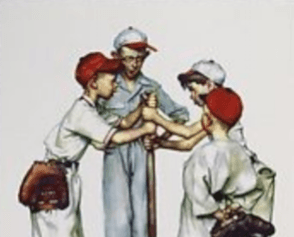
As I kid I was very fortunate to have the best Wiffle ball backyard in the neighborhood. We played with as few as two players but the best games were when we had bunch of kids. The challenge was choosing fair teams. We relied on an "ancient" ritual. This particular ritual provided a somewhat fair way to at least begin the "Choosin' Up" as Norman Rockwell's painting is titled. From there, teams were chosen primarily based on skill level. When a small number of kids were playing, the winning team was often determined by who "won" the coveted first pick. Of course it was never a good thing to be chosen last but we'll get back to that later. How does this apply to the Gospel you ask? Read on to find out. At that time, Jesus withdrew to the region of Tyre and Sidon. And behold, a Canaanite woman of that district came and called out, "Have pity on me, Lord, Son of David! My daughter is tormented by a demon." But Jesus did not say a word in answer to her. Jesus' disciples came and asked him, "Send her away, for she keeps calling out after us." He said in reply, "I was sent only to the lost sheep of the house of Israel." But the woman came and did Jesus homage, saying, "Lord, help me." He said in reply, "It is not right to take the food of the children and throw it to the dogs." She said, "Please, Lord, for even the dogs eat the scraps that fall from the table of their masters." Then Jesus said to her in reply, "O woman, great is your faith! Let it be done for you as you wish." And the woman's daughter was healed from that hour. Matthew 15:21-28 "I was sent only to the lost sheep of the house of Israel." This seems very exclusionary as Jesus reminds the disciples that His ministry is to those Israelites who have strayed from God. Jesus' words to the Canaanite woman seem even more harsh as He makes reference to non-Israelites as dogs. In this scenario the Canaanite woman doesn't seem to have a chance at even being the last one chosen. The message can't be more clear. You don't belong. However, there is a different dynamic at work here. Something very significant happens. This story, in the middle of Matthew's Gospel, cracks the door to salvation for the Gentiles. Jesus came for all! Everyone belongs. While Jesus never physically left Israel, the salvation He brought through Israel was for all. With hindsight you and I understand that. As His disciples we are responsible for inviting everyone to follow Jesus. In our world where people are separated by every imaginable boundary this can be challenging. Jesus sees no boundaries, no differences, no barriers. Are you living to break down those barriers? Or do you get caught up in the divisiveness that is so prevalent today? Jesus doesn't need an ancient ritual to choose sides. He died for all!

